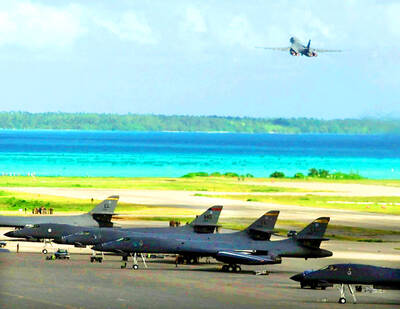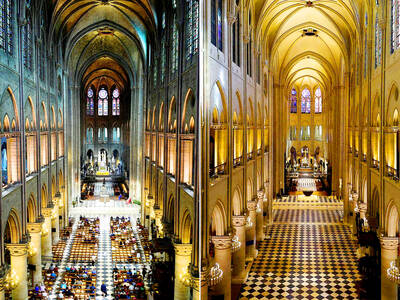Bolivia was facing worsening strife yesterday after Bolivian President Evo Morales and his political foes exchanged ultimatums and blame over unrest that has already claimed at least 17 lives.
The crisis has taken on international proportions, with the US ambassador to Bolivia expected to return to Washington after being booted out by Morales, and Brazil and Argentina concerned over natural gas supplies from their beleaguered neighbor.
The unrest was the biggest challenge Morales has faced since becoming Bolivia’s first indigenous president in 2006.
The president’s attempts to railroad through socialist reforms to redistribute land and natural gas revenues to the country’s 6 million-strong indigenous majority have been met with fierce resistance from conservative governors in five of Bolivia’s nine states — Santa Cruz, Pando, Beni, Tarija and Chuquisaca.
They are opposed to his call for a December referendum to decide a new constitution enshrining his changes and want more control over revenues from lucrative gas fields. They are pushing for autonomy.
Chief opposition figure Ruben Costas, the governor of the eastern state of Santa Cruz, told reporters overnight that prospects of a negotiated solution to the unrest were dim.
“We warn that if there is just one more death or person wounded, any possibility of dialogue will be broken,” he said.
Morales, for his part, told union leaders in central Bolivia that he would not deviate from his push for controversial socialist reforms that sparked the rebellion.
“We have always cried ‘fatherland or death.’ If we don’t emerge victorious, we have to die for the country and the Bolivian people,” said the leftwing leader, who took power as Bolivia’s first indigenous president in 2006.
The Morales government has accused the opposition governor of the northern state of Pando of being responsible for most of the deaths that occurred there since Tuesday.
Interior Minister Alfredo Rada said governor Leopoldo Fernandez was suspected of being behind a “massacre” of 16 rural workers by anti-government militants, some of whom were said to be armed state government employees.
A local farmers’ leader, Shirley Segovia, told Erbol radio the victims “were killed like pigs, with machine guns, with rifles, with shotguns, with revolvers.”
Unconfirmed reports said that Fernandez had fled to Brazil.
Morales decreed martial law for the state and sent 100 troops by airplane to the principal city of Cobija to retake the airport which had been seized by protesters. One of the soldiers was killed in the operation, the defense ministry said.
Information coming out of Cobija, Pando’s principal city, was difficult to verify because there were no flights there and roadblocks in much of eastern Bolivia hindered ground traffic.

South Korean President Yoon Suk Yeol on Tuesday declared martial law in an unannounced late night address broadcast live on YTN television. Yoon said he had no choice but to resort to such a measure in order to safeguard free and constitutional order, saying opposition parties have taken hostage of the parliamentary process to throw the country into a crisis. "I declare martial law to protect the free Republic of Korea from the threat of North Korean communist forces, to eradicate the despicable pro-North Korean anti-state forces that are plundering the freedom and happiness of our people, and to protect the free

CHAGOS ISLANDS: Recently elected Mauritian Prime Minister Navin Ramgoolam told lawmakers that the contents of negotiations are ‘unknown’ to the government Mauritius’ new prime minister ordered an independent review of a deal with the UK involving a strategically important US-UK military base in the Indian Ocean, placing the agreement under fresh scrutiny. Under a pact signed last month, the UK ceded sovereignty of the Chagos archipelago to Mauritius, while retaining control of Diego Garcia — the island where the base is situated. The deal was signed by then-Mauritian prime minister Pravind Jugnauth and British Prime Minister Keir Starmer on Oct. 3 — a month before elections in Mauritius in which Navin Ramgoolam became premier. “I have asked for an independent review of the

France on Friday showed off to the world the gleaming restored interior of Notre-Dame cathedral, a week before the 850-year-old medieval edifice reopens following painstaking restoration after the devastating 2019 fire. French President Emmanuel Macron conducted an inspection of the restoration, broadcast live on television, saying workers had done the “impossible” by healing a “national wound” after the fire on April 19, 2019. While every effort has been made to remain faithful to the original look of the cathedral, an international team of designers and architects have created a luminous space that has an immediate impact on the visitor. The floor shimmers and

‘VIOLATIONS OF DISCIPLINE’: Miao Hua has come up through the political department in the military and he was already fairly senior before Xi Jinping came to power in 2012 A member of China’s powerful Central Military Commission has been suspended and put under investigation, the Chinese Ministry of National Defense said on Thursday. Miao Hua (苗華) was director of the political work department on the commission, which oversees the People’s Liberation Army (PLA), the world’s largest standing military. He was one of five members of the commission in addition to its leader, Chinese President Xi Jinping (習近平). Ministry spokesman Colonel Wu Qian (吳謙) said Miao is under investigation for “serious violations of discipline,” which usually alludes to corruption. It is the third recent major shakeup for China’s defense establishment. China in June